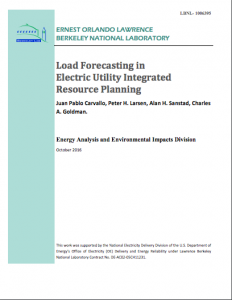Full Title: Load Forecasting in Electric Utility Integrated Resource Planning
Author(s): Juan Pablo Carvallo, Peter H. Larsen, Alan H. Sanstad, Charles
Publisher(s): Berkeley National Laboratory
Publication Date: October 1, 2016
Full Text: Download Resource
Description (excerpt):
Integrated resource planning (IRP) is a process used by many vertically-integrated U.S. electric utilities to determine least-cost/risk supply and demand-side resources that meet government policy objectives and future obligations to customers and, in many cases, shareholders. Forecasts of energy and peak demand are a critical component of the IRP process. There have been few, if any, quantitative studies of IRP long-run (planning horizons of two decades) load forecast performance and its relationship to resource planning and actual procurement decisions. In this paper, we evaluate load forecasting methods, assumptions, and outcomes for 12 Western U.S. utilities by examining and comparing plans filed in the early 2000s against recent plans, up to year 2014. We find a convergence in the methods and data sources used. We also find that forecasts in more recent IRPs generally took account of new information, but that there continued to be a systematic over-estimation of load growth rates during the period studied. We compare planned and procured resource expansion against customer load and year-to-year load growth rates, but do not find a direct relationship. Load sensitivities performed in resource plans do not appear to be related to later procurement strategies even in the presence of large forecast errors. These findings suggest that resource procurement decisions may be driven by other factors than customer load growth. Our results have important implications for the integrated resource planning process, namely that load forecast accuracy may not be as important for resource procurement as is generally believed, that load forecast sensitivities could be used to improve the procurement process, and that greater emphasis should be placed on strategies to manage uncertainties in load forecasts
